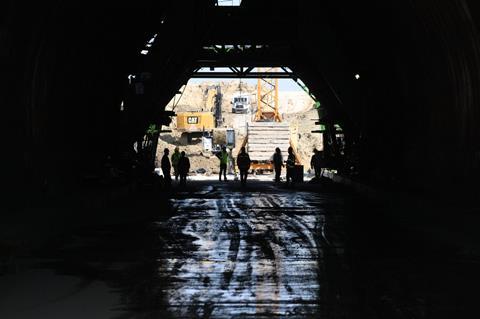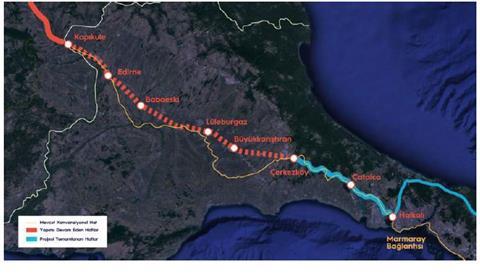
TURKEY: The country’s highest administrative court has cancelled the contract awarded in June last year for reconstruction of TCDD’s main line between Ispartaküle and Halkalı, which forms the southern section of the Turkey’s principal rail link with western Europe.
The Council of State ruled that the ‘closed’ tendering process, which was not announced in advance and under which only invited companies were allowed to bid, was illegal.
It rejected an argument by the Ministry of Transport & Infrastructure that a closed tender was needed due to the ‘urgency’ of the project, pointing out that the tender covered for work to be completed within 1 170 days. The tender law defined ‘urgent’ as relating to situations such as natural disasters, epidemics and danger of loss of life or property, but the court said none of these applied in this case.

Including a planned realignment for 200 km/h running, the reconstruction of the main line between the Bulgarian border at Kapıküle/Svilengrad and Halkalı has been made more complex because of the planned development of the Kanal Istanbul ship canal. That is intended to link the Black Sea to the Sea of Marmara, bypassing the Bosporus straits, but would bisect the railway alignment between Halkalı and Ispartakule, necessitating a rerouting of up to 10 km of the line. Construction of twin-bore tunnel under the future waterway had been included as part of the tender.
The civil works contract was won by a consortium of Gülermak, Yapı Merkezı and Taşyapı with a bid of TL3·1bn, the lowest of five bids submitted from the nine groups invited to bid. Apart from the proposed tunnel, no details of the work packages covered by the contract had been released.
Changing background
Meanwhile, development of both the canal and the railway could now be impacted by the war in Ukraine. The main rationale for construction of the canal, which has been strongly backed by Turkish President Recep Tayyip Erdoğan, was the increase in oil tanker traffic through the Bosporus to the Black Sea serving the Caspian oil fields belonging to Kazakhstan and Russia. That trade is now under threat due to the international embargo on Russian oil and the possible rerouting of Kazakh crude via other pipelines.
At the same time, the war is also expected to have a long-term impact on rail-borne Eurasian freight between China, eastern Asia and Europe, most of which had until recently passed through Russia. Restrictions on that corridor could make the so-called ‘middle route’ through Turkey, Georgia and Azerbaijan an appealing alternative for shippers seeking to continue using rail.
The rebuilding of the Kapıküle – Halkalı corridor had been scheduled for completion by 2027. This was to have been complemented by the long-planned Istanbul orbital freight line linking Halkalı with Gebze via the Yavuz Selim bridge from 2029, which would enable freight trains to avoid the busy Marmaray suburban corridor through the centre of the city.
These deadlines were included as conditions for a €275m EU grant and a €150m EBRD loan granted to Turkey in the last two years, but they now appear unlikely to be met unless the tendering can be restarted rapidly or the court ruling can be overturned on appeal.

















